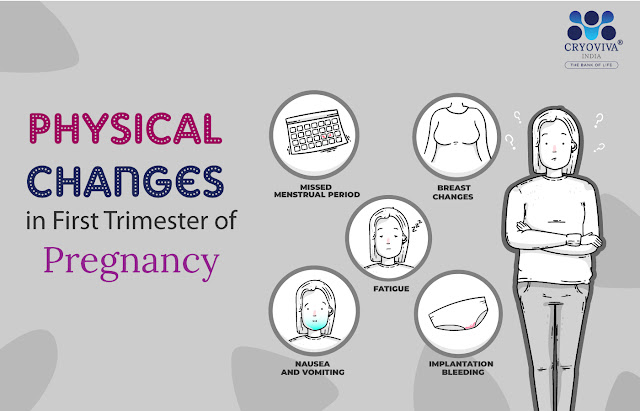- Get link
- X
- Other Apps
- Get link
- X
- Other Apps
Pregnancy is an astounding and transforming experience in a woman's life. However, as your pregnancy progresses, the metamorphosis will change your body dramatically to accommodate the growth and development of a new life. The changes might vary from one woman to another depending on their general health status, medications prescribed, diet, lifestyle, and self-care routine. However, to help you know what to expect, here are a few common physical changes in pregnancy that women experience.
8 Physical Changes in the Pregnancy’s First Trimester
1. Swollen or Tender Breasts
Your breasts will change in various ways during the first trimester. Due to the enlargement of mammary glands for lactation, the breasts will grow and become tender for breastfeeding due to the rise in oestrogen and progesterone. However, the discomfort due to the sensitivity will subside during the second trimester.
In addition to the common physical changes experienced during pregnancy, it's also worth considering stem cell banking. Stem cell banking involves collecting and storing stem cells from your baby's umbilical cord blood, which can be used for potential medical treatments in the future. Stem cells are unique in their ability to develop into various types of cells in the body, making them valuable for potential treatments of diseases and conditions. Many parents choose to bank their baby's stem cells as a form of insurance, in case their child or family member needs them in the future. It's worth discussing with your healthcare provider and researching different stem cell banking options to make an informed decision about whether it's the right choice for you and your family.
2. Fatigue
Fatigue is a common physical change in pregnancy that will make you feel more tired, and you will find yourself resting more frequently. Experts advise pregnant women to stay positive during pregnancy get as much rest as possible and take frequent breaks to prevent over-stressing and exhaustion.
3. Frequent or Increased Urination
As your foetus grows, your womb adjusts to its growth. The growth in the uterus will add some pressure to your bladder, resulting in the frequent need for urination and inconvenience. Increased urination is common during the first few and third trimesters of pregnancy.
4. Visible Veins
During the first trimester, your body produces more blood, increasing circulation. It means you will have more visible veins prominent in the legs and breasts.
5. Backache
A study has found that approximately 50-75% of pregnant women tend to experience backache at some point in the first trimester of their pregnancy. The pain can affect the upper or lower back due to the pregnancy hormones – progesterone and relaxin. Often, the back pain is accompanied by swollen legs, tingly or numb feeling in the hands, and headache.
Read also: Five Tips for Caring Yourself in Pregnancy
In addition, the substantial increase in body water retention will be visible in the legs and feet, making simple actions like walking and standing challenging. The sudden or temporary weight gain in the belly might also cause difficulty in movement.
6. Skin Changes
You will notice healthier and glowing skin during the first trimester of pregnancy, often known as 'pregnancy glow'. It is because of hormonal changes and the extra circulation of blood to the skin. On the other hand, pregnancy hormones might negatively affect the skin by causing pigmentation, rashes, and dark circles. The increase in oil secretion might also cause acne outbreaks.
7. Hair Growth
Usually, around 100 human hair strands fall out, and new hair strands grow back daily as a cyclical process. At the time of pregnancy, the follicles will be in a growing phase that causes a spike in the volume of your hair. After birth, the follicles will start to fall out due to the stress caused in the postpartum phase.
8. Heartburn and Constipation
The increased hormone changes will make a woman plagued by uncomfortable physical changes such as heartburn during pregnancy and constipation in the first trimester. Nausea is the most common symptom of the condition, which may also cause frequent vomiting.
You can consult your healthcare professional and follow some home remedies that aid in healthy digestion. For instance, avoid eating spicy foods that might cause heartburn. Try eating smaller meals daily and adding more fibre-rich foods to prevent constipation.
Wrapping Up
As you undergo these physical changes in pregnancy, keep an eye on every symptom and development to avoid stress and unwanted distress. The umbilical cord blood stem cell is a haven of miracles during and after pregnancy. At Cryoviva, we harness the true potency of stem cell banking through a unique preservation system to safely and easily store your infant's cord cells. Contact us today!
First Trimester Changes
First Trimester Development
First Trimester Journey
Pregnancy Body Changes
pregnancy care
Pregnancy Progress
Pregnancy Symptoms
Pregnancy Transformation
stem cell banking
Location:
India
- Get link
- X
- Other Apps

Comments
Post a Comment